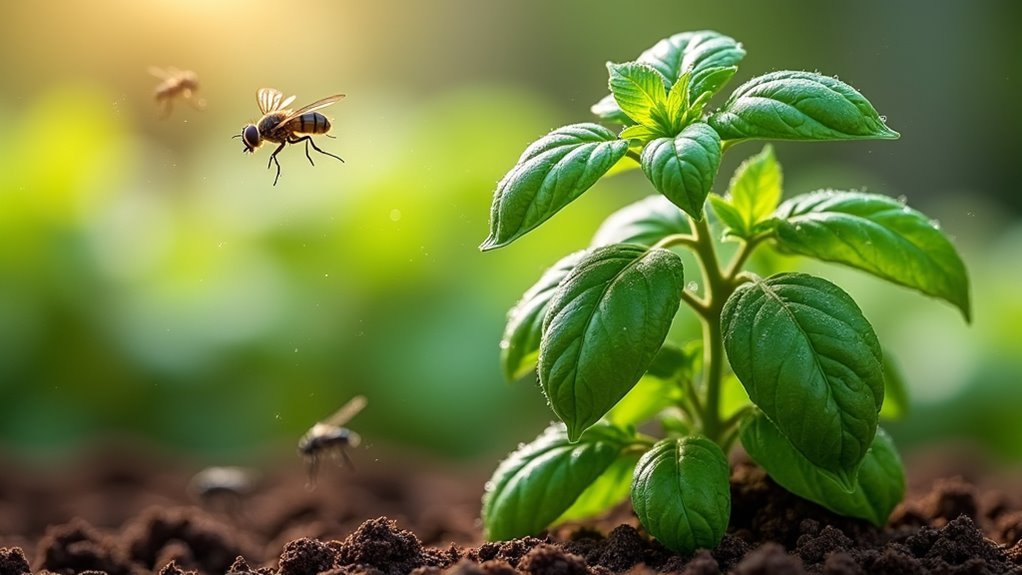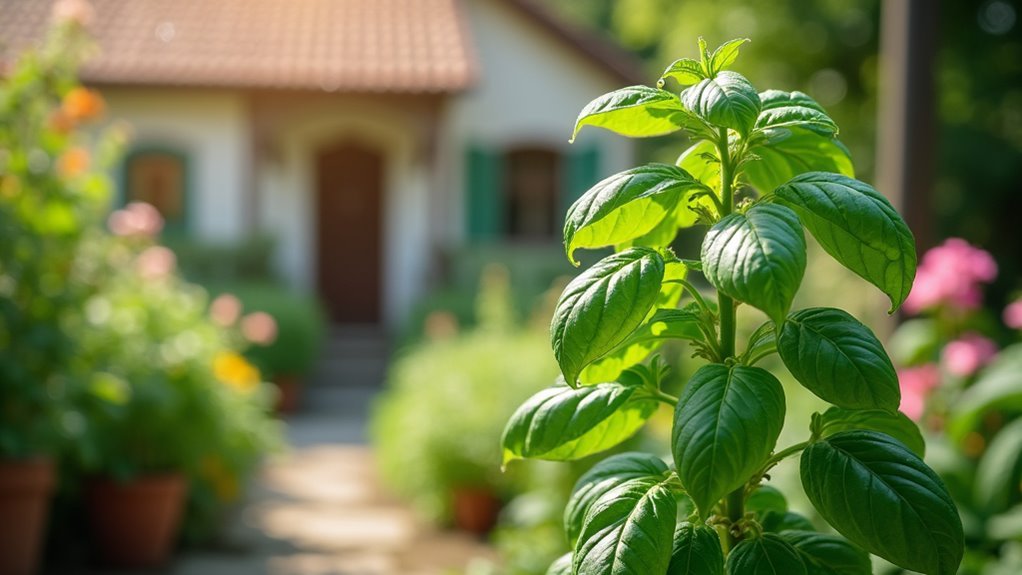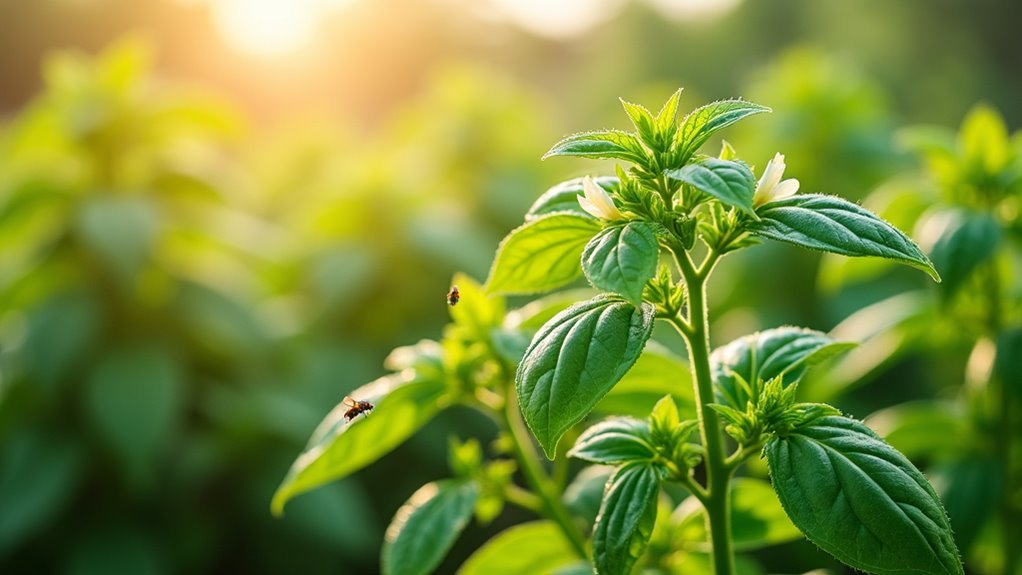You can naturally repel flies and mosquitoes by planting basil around your home, as this aromatic herb contains estragole and citronellal compounds that create an invisible barrier against these pests. Position basil varieties like Genovese, Thai, or Lemon Basil near doorways, patios, and outdoor dining areas for maximum effectiveness. The plant’s strong fragrance masks food scents that attract insects while serving dual purposes in your kitchen. Strategic placement and proper care will reveal basil’s full protective potential.
How Basil’s Natural Compounds Repel Flies and Mosquitoes

When flies and mosquitoes invade your outdoor space, basil’s natural compounds work as your first line of defense. This aromatic herb contains estragole and citronellal, powerful compounds that effectively repel these irritating pests. The strong aroma masks food scents and other attractants that typically draw insects to your garden.
Basil’s essential oils become even more potent when you brush against or bruise the leaves, releasing concentrated pest-repelling properties that create an invisible barrier. This natural defense system doesn’t require harsh chemicals or expensive treatments.
You’ll discover that incorporating basil into your garden serves dual purposes – keeping unwanted insects away while providing fresh herbs for culinary use. It’s an efficient, natural solution that protects your outdoor areas while enhancing your cooking.
Best Basil Varieties for Maximum Pest Control Effectiveness
Not all basil varieties pack the same punch when it comes to deterring flies and mosquitoes. Genovese Basil leads the charge with its robust essential oils, making it exceptionally effective for pest control in your garden environment.
Genovese Basil’s powerful essential oils make it the top choice for natural fly and mosquito control in gardens.
Thai Basil’s strong aroma works overtime to repel pests while enhancing your cooking repertoire. Lemon Basil brings unique citrus-scented power that flies can’t stand, offering dual culinary and protective benefits.
Purple Basil combines visual appeal with potent fragrance compounds that effectively ward off unwanted insects. Holy Basil stands out for its medicinal properties and intense scent that keeps flies at bay.
You’ll maximize your garden’s natural defense by selecting these high-performance varieties that consistently repel pests through their concentrated aromatic compounds.
Strategic Placement of Basil Plants Around Your Home and Garden

Proper placement transforms basil from a simple herb into a strategic defense system that actively protects your living spaces from flying pests.
Position basil pots around patios and doorways where its strong aroma creates an effective natural repellent barrier against flies and mosquitoes. Place plants near outdoor dining areas to enhance meals while deterring unwanted insects.
In vegetable gardens, use basil as companion plants alongside tomatoes to maximize pest control benefits. Strategic placement near water sources helps prevent mosquito larvae development.
For peak effectiveness, guarantee your basil grows in well-drained soil with full sunlight exposure. This positioning strategy maximizes the plant’s repellent capabilities while maintaining its health and aromatic potency throughout the growing season.
Companion Planting Basil With Vegetables for Enhanced Protection
Beyond its defensive perimeter around outdoor spaces, basil transforms into an invaluable ally when you integrate it directly into your vegetable gardens through companion planting.
This strategic approach creates a natural barrier that protects your crops while promoting healthy growth.
Basil’s strong aroma effectively masks your vegetables’ scent, making it harder for pests to locate their targets.
Here’s how companion planting with basil enhances your garden’s protection:
- Plant basil near tomatoes to repel tomato hornworm and enhance flavor
- Position basil around peppers to deter various garden pests
- Use basil’s compounds to shield crops from aphids and flies
- Attract beneficial insects that prey on harmful pests
- Improve overall biodiversity for a balanced garden ecosystem
You’ll notice increased yields and healthier plants when basil works as your garden’s natural protector.
Maintaining Healthy Basil Plants for Year-Round Fly Defense

While companion planting establishes basil’s protective role in your garden, maintaining the health of these aromatic plants guarantees they’ll continue defending against flies throughout the growing season.
Plant basil in well-drained soil with full sunlight exposure to maximize oil production that creates those strong scents flies despise. You’ll need to maintain consistent watering without oversaturating, as soggy conditions attract gnats that compromise your pest-repelling efforts.
Pinch back leaves regularly to encourage bushier growth and stronger aromatic compounds. Apply balanced fertilizer every 4-6 weeks to keep plants robust and healthy.
Monitor for pests regularly, treating infestations with organic horticultural soap when necessary. These practices guarantee your basil maintains its natural pest-repelling properties season-long.
Frequently Asked Questions
How to Use Basil to Keep Flies Away?
Plant potted basil around doorways and patios where its strong aroma naturally repels flies. You’ll want to regularly bruise the leaves to release more essential oils, maximizing the pest-deterring effects throughout your space.
How to Get Rid of Little Flies on Basil Plants?
You’ll need to inspect your basil regularly and remove flies by hand. Spray affected plants with soapy water, guarantee proper drainage, introduce beneficial insects, and place yellow sticky traps nearby.
Does Basil and Mint Keep Flies Away?
Yes, basil and mint effectively repel flies through their strong essential oils like estragole and menthol. You’ll find they work best when planted together in sunny spots with well-drained soil.
Does Holy Basil Repel Flies?
Yes, you’ll find holy basil effectively repels flies through its potent essential oils containing eugenol. You should plant it near doorways or patios and brush it regularly to release the fly-deterring compounds.
In Summary
You’ve discovered that basil isn’t just a culinary herb—it’s a powerful natural fly repellent that’ll transform your outdoor spaces. By choosing the right varieties, positioning them strategically, and pairing them with your vegetables, you’ll create an effective barrier against pesky insects. Keep your basil plants healthy and thriving, and they’ll reward you with continuous protection while adding fresh flavor to your meals year-round.





Leave a Reply